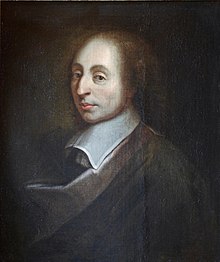 Global Information
Global InformationBlaise Pascal information
Blaise Pascal | |
|---|---|
 Portrait of Pascal in 1691 | |
| Born | 19 June 1623 Clermont-Ferrand, Auvergne, France |
| Died | 19 August 1662 (aged 39) Paris, France |
| Parent |
|
| Relatives | Marguerite Périer (niece) Jacqueline Pascal (sister) Gilberte Périer (sister) |
Philosophy career | |
| Era | 17th-century philosophy |
| Region | Western philosophy |
| School |
|
Main interests |
|
Notable ideas |
|
| Signature | |
|
Preview warning: Page using Template:Infobox philosopher with unknown parameter "influences" Preview warning: Page using Template:Infobox philosopher with unknown parameter "influenced" | |
| Part of a series on |
| Catholic philosophy |
|---|
   |
|
Blaise Pascal (/pæˈskæl/ pass-KAL, also UK: /-ˈskɑːl, ˈpæskəl, -skæl/ -KAHL, PASS-kəl, -kal, US: /pɑːˈskɑːl/ pahs-KAHL;[3][4][5][6][7] French: [blɛz paskal]; 19 June 1623 – 19 August 1662) was a French mathematician, physicist, inventor, philosopher, and Catholic writer.
Pascal was a child prodigy who was educated by his father, a tax collector in Rouen. His earliest mathematical work was on conic sections; he wrote a significant treatise on the subject of projective geometry at the age of 16. He later corresponded with Pierre de Fermat on probability theory, strongly influencing the development of modern economics and social science. In 1642, he started some pioneering work on calculating machines (called Pascal's calculators and later Pascalines), establishing him as one of the first two inventors of the mechanical calculator.[8][9]
Like his contemporary René Descartes, Pascal was also a pioneer in the natural and applied sciences. Pascal wrote in defense of the scientific method and produced several controversial results. He made important contributions to the study of fluids, and clarified the concepts of pressure and vacuum by generalising the work of Evangelista Torricelli. Following Torricelli and Galileo Galilei, he rebutted the likes of Aristotle and Descartes who insisted that nature abhors a vacuum in 1647.
In 1646, he and his sister Jacqueline identified with the religious movement within Catholicism known by its detractors as Jansenism.[10] Following a religious experience in late 1654, he began writing influential works on philosophy and theology. His two most famous works date from this period: the Lettres provinciales and the Pensées, the former set in the conflict between Jansenists and Jesuits. The latter contains Pascal's wager, known in the original as the Discourse on the Machine,[11][12] a fideistic probabilistic argument for God's existence. In that year, he also wrote an important treatise on the arithmetical triangle. Between 1658 and 1659, he wrote on the cycloid and its use in calculating the volume of solids.
- ^ Vincent Jullien (ed.), Seventeenth-Century Indivisibles Revisited, Birkhäuser, 2015, p. 188.
- ^ Cite error: The named reference
MCSwas invoked but never defined (see the help page). - ^ Wells, John (3 April 2008). Longman Pronunciation Dictionary (3rd ed.). Pearson Longman. ISBN 978-1-4058-8118-0.
- ^ "Pascal" Archived 6 January 2015 at the Wayback Machine. Random House Webster's Unabridged Dictionary.
- ^ "Pascal, Blaise". Lexico UK English Dictionary. Oxford University Press. Archived from the original on 5 December 2021.
- ^ "Pascal". Collins English Dictionary. HarperCollins. Archived from the original on 14 August 2019. Retrieved 14 August 2019.
- ^ "Pascal". Merriam-Webster.com Dictionary. Retrieved 14 August 2019.
- ^ See Schickard versus Pascal: An Empty Debate? Archived 8 April 2014 at the Wayback Machine and Marguin, Jean (1994). Histoire des instruments et machines à calculer, trois siècles de mécanique pensante 1642–1942 (in French). Hermann. p. 48. ISBN 978-2-7056-6166-3.
- ^ d'Ocagne, Maurice (1893). Le calcul simplifié (in French). Gauthier-Villars et fils. p. 245. Archived from the original on 9 August 2018. Retrieved 14 May 2010.
- ^ "Blaise Pascal". Catholic Encyclopedia. Archived from the original on 10 March 2009. Retrieved 23 February 2009.
- ^ Grumball, Kevin Shaun. "Thesis submitted to the University of Nottingham for the degree of Doctor of Philosophy" (PDF). University of Nottingham. Archived (PDF) from the original on 5 June 2020. Retrieved 20 October 2022.
- ^ "Internet History Sourcebooks". sourcebooks.fordham.edu. Archived from the original on 19 October 2022. Retrieved 20 October 2022.